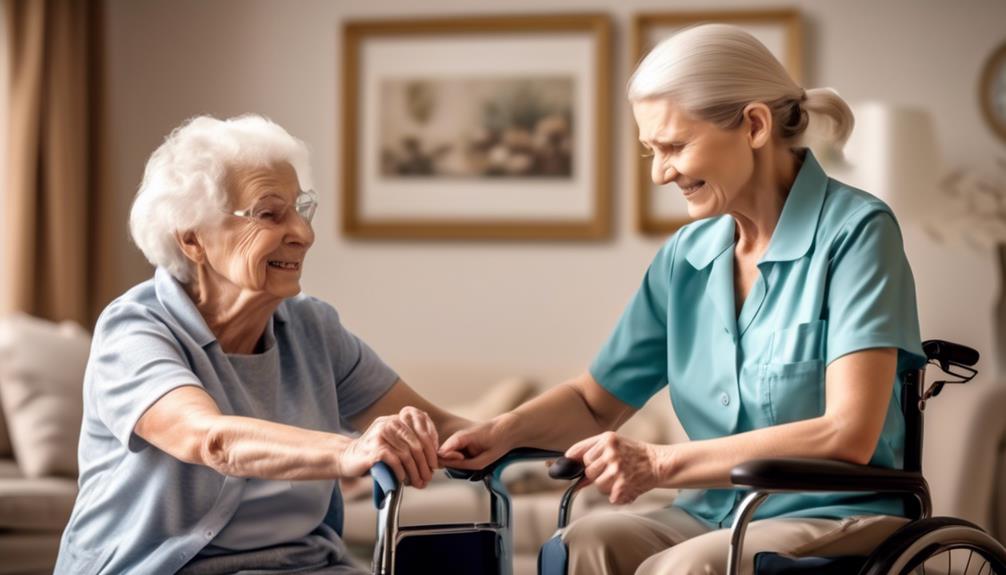When examining the challenges faced by people in caregiving roles, it is evident that their own health is directly linked to the quality of care they provide. For instance, take into account the difficulties that spouses face as they care for their loved ones and experience heightened levels of stress. This scenario calls for an evaluation of the sustainability of prolonged caregiving responsibilities and the effects on the caregivers’ well-being.
However, amidst these complexities lies a fresh perspective that demands exploration. How can we ensure the longevity and well-being of those who devote themselves to caring for others? The answer may lie in a paradigm shift that prioritizes caregivers' self-care practices.
Key Takeaways
- Caregiving stress impacts genetic and molecular levels, shortening lifespan.
- Support systems like interventions and self-care practices crucial for caregivers' well-being.
- Recognition and appreciation improve morale and overall caregiving experience.
- Caregivers face challenges like depression, accelerated aging, and altered immune cells.
Challenges Faced by Caregivers
Frequently, caregivers encounter a multitude of challenges that impact their well-being and longevity, requiring resilience and support to navigate effectively.
Family caregivers, especially those looking after the chronically ill, face significant hurdles daily. The stress of caregiving not only affects their mental and emotional well-being but also manifests physically, leading to various health implications. Studies suggest that caregivers may have their lifespan shortened by 4 to 8 years due to the chronic stress they experience. This stress can alter genetic and molecular levels in the body, affecting telomeres, which are crucial for cell division and replication.
Changes in immune cells due to caregiving stress indicate accelerated aging and potential health risks for caregivers. Additionally, psychological surveys have shown that caregivers often battle severe symptoms of depression, highlighting the immense burden they carry.
Understanding and addressing these challenges faced by family caregivers is vital for providing them with the necessary support and resources to cope effectively.
Impact of Caregiving on Health

In our experience, the impact of caregiving on health is profound and far-reaching, often leading to accelerated aging and heightened vulnerability to various health risks. Family caregiving can take a toll on one's well-being, potentially shortening the caregiver's lifespan by 4 to 8 years due to the chronic stress it entails. Research indicates that the incessant stress from caregiving can influence genetic and molecular mechanisms in the body, contributing to accelerated aging processes.
Telomeres, crucial areas of genetic material on chromosomes, have become a focal point in studying the effects of caregiving on health. Caregivers also show alterations in immune cells, hinting at accelerated aging and potential health consequences.
Moreover, psychological surveys reveal that caregivers often battle more severe symptoms of depression, highlighting the mental health toll of caregiving responsibilities. Understanding the implications of caregiving on health is vital for devising effective support systems and interventions to safeguard the well-being of those who selflessly care for their loved ones.
Support Systems for Caregivers
Support systems for caregivers play a pivotal role in providing essential outlets and resources for managing the challenges of caregiving responsibilities. Caregivers often face immense pressure and emotional turmoil as they navigate their roles, making it crucial for them to have a strong support system in place. Support groups offer a safe space for caregivers to share their experiences, seek advice, and find comfort in knowing they are not alone in their journey. Additionally, ongoing studies are focusing on developing effective interventions tailored to help caregivers cope with stress and maintain their overall well-being. Prioritizing self-care practices, such as meditation, exercise, and socializing, is also recommended to ensure caregivers are looking after their own health and resilience. Here is a table highlighting some key aspects of support systems for caregivers:
| Support Systems | Benefits |
|---|---|
| Support Groups | Provide emotional support and camaraderie |
| Interventions | Help caregivers cope with stress |
| Self-Care Practices | Promote caregiver health and resilience |
Importance of Self-Care for Caregivers

Taking care of oneself isn't just a luxury but a necessity for caregivers facing the demanding challenges of providing constant support and assistance to their loved ones. The effects of caregiving can be profound, with studies showing that caregivers for parents or chronically ill children may have their lifespan shortened by 4 to 8 years.
Chronic stress from caregiving can impact the body at genetic and molecular levels, with a focus on telomeres, areas of genetic material on chromosomes. Caregivers also exhibit changes in immune cells, indicating accelerated aging. Psychological surveys further reveal that caregivers often experience more severe symptoms of depression.
This highlights the critical importance of self-care practices for caregivers to mitigate the negative impacts of their role. Engaging in self-care activities such as exercise, relaxation techniques, seeking social support, and taking breaks can help caregivers maintain their well-being and resilience in the face of these challenges.
Prioritizing self-care isn't selfish but essential for caregivers to continue providing effective care while safeguarding their own health and longevity.
Recognition and Appreciation for Caregivers
Recognizing and acknowledging the tireless dedication of caregivers is paramount in fostering a supportive and nurturing environment for both the caregivers and those they care for. Caregivers report an increase in self-confidence, recognition, and gratitude for their efforts. Family caregivers, especially those caring for aging family members, often experience undeniable benefits when their care is met with expressions of gratitude. This acknowledgment and appreciation are not just gestures; they play a vital role in boosting the morale and overall well-being of caregivers. When care recipients express gratitude, it contributes significantly to a positive caregiving experience for all involved.
| Recognition and Appreciation | Impact | Sources |
|---|---|---|
| Boosts morale and well-being | Positive effect on caregivers | Caregivers' reports |
| Fosters a supportive environment | Nurturing care atmosphere | Care recipient feedback |
| Acknowledges challenges faced | Enhances caregiver self-confidence | Family caregiver experiences |
| Cultivates gratitude | Improves overall caregiving experience | Care recipient expressions |
Frequently Asked Questions
What Is Caretaker Syndrome?
Caretaker syndrome refers to the overwhelming emotional and physical toll experienced by caregivers. It manifests through symptoms like guilt, exhaustion, and neglect of personal health. This condition can lead to negative health outcomes, including depression, anxiety, and chronic illnesses, impacting both the caregiver's and care recipient's well-being.
Addressing caretaker syndrome is crucial to prevent burnout and ensure the overall health and quality of life for both parties involved.
What Are 3 Symptoms of Caregiver Burnout?
Sure thing!
Three common symptoms of caregiver burnout are increased irritability, feelings of helplessness, and emotional exhaustion.
These signs can often lead to physical symptoms like headaches, digestive issues, and sleep disturbances.
It's crucial to recognize these warning signals early, allowing caregivers to take proactive steps to prevent further burnout and prioritize their own well-being.
It's essential for us all to care for ourselves while caring for others.
Can You Get PTSD From Being a Caregiver?
Yes, caregivers can develop PTSD due to chronic stress, traumatic events, and emotional strain from caregiving responsibilities. Symptoms may include flashbacks, nightmares, avoidance behaviors, hypervigilance, and mood disturbances.
Research indicates up to 30% of family caregivers experience PTSD. It can impact mental health, physical well-being, and caregiving effectiveness.
Seeking professional help, support groups, and self-care practices are crucial for caregivers with PTSD symptoms.
Do Caregivers Have a Shorter Life Expectancy?
Yes, caregivers do have a shorter life expectancy. Research suggests their lifespan may be reduced by 4 to 8 years due to chronic stress.
This stress impacts genetic and molecular levels, leading to accelerated aging markers like changes in immune cells and more severe depression symptoms.
It's crucial to support caregivers to mitigate these effects and help them lead healthier, longer lives.
How Does Human Recall Affect the Lifespan of Caregivers?
The act of caregiving is intertwined with sparking human recall essence, as memories of the past and shared experiences are vividly brought to life. These recollections can impact the lifespan of caregivers, influencing their emotional well-being and ability to cope with the challenges of their role.
Conclusion
As caregivers, we must remember to prioritize our own well-being in order to provide the best care for our loved ones.
Just as a flower needs sunlight to thrive, we need self-care to flourish and bloom in our caregiving journey.
Let's water our own roots with self-love and appreciation, so that we can continue to nurture those around us with strength and compassion.
It's time to blossom into the caregivers we were meant to be.









